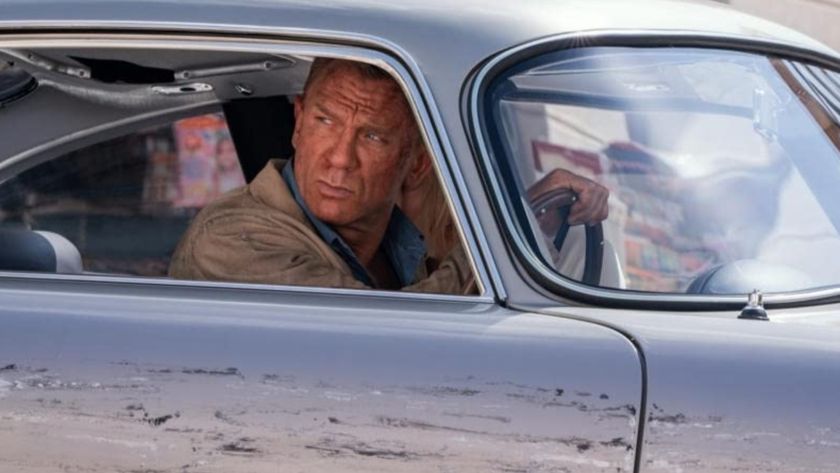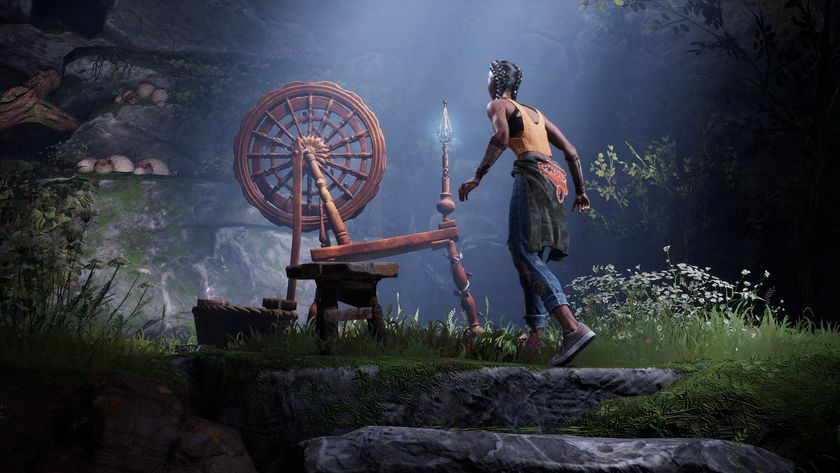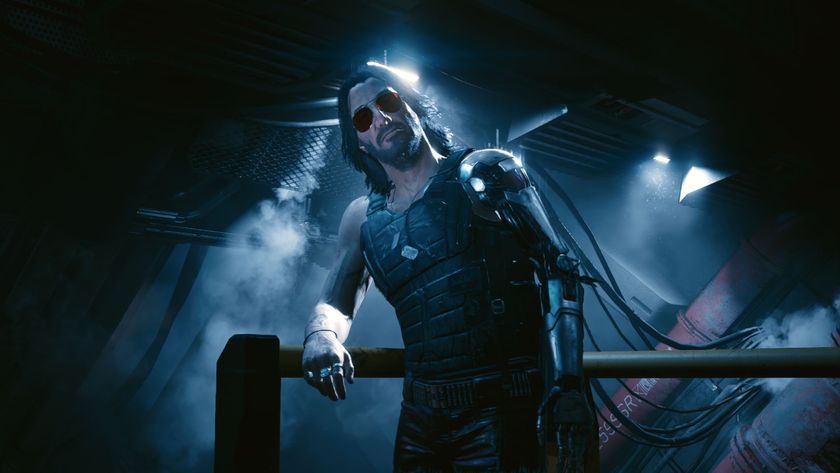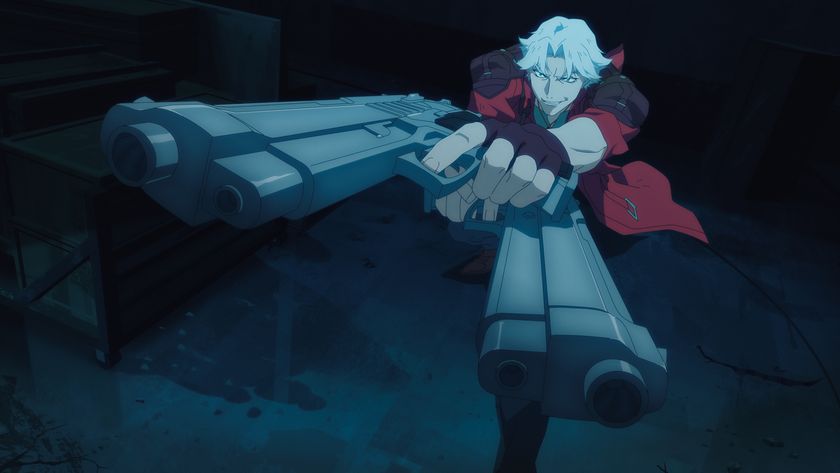Movies to watch this week at the cinema: Phantom Thread, Journey's End, and more

Out on Friday February 2
Paul Thomas Anderson crafts another classic of obsession and strange love. Sam Claflin and Paul Bettany stand out among an impressive ensemble.
Yes, here's this week's new releases. Click on for our reviews of Phantom Thread, Journey’s End, Winchester, Tokyo Ghoul, Lies We Tell, Makala, Roman J. Israel, Esq, and Den of Thieves.
For the best movie reviews, subscribe to Total Film.

Phantom Thread
In many film romances, a belief in finding ‘the one’ is woven deep into the plot fabric. But what if the lead character is a mother-fixated, man-child creative with a profound inability to countenance disturbance or compromise? What might this genius’ chosen ‘one’ look like?
Ask Paul Thomas Anderson, who knows all about complicated love between complicated individuals. True, his eighth feature initially seems another radical departure in a career of many. If Boogie Nights and Magnolia offered sprawling, emotive contrasts to Hard Eight’s clipped neo-noir cool, Punch-Drunk Love was a short, sharp about-turn again. There Will Be Blood affirmed Anderson’s radicalism; The Master went weirder with its close-coiled cult dissections; and Inherent Vice loosened the coils for ramshackle private dick-ery.
At first, Phantom Thread’s tightwound front couldn’t seem more different. Set at a rarefied remove from its ’50s backdrop, it presents a meticulous character study of fastidious clothes designer Reynolds Woodcock, played by Daniel Day-Lewis in a performance pinched with hollowed-out precision. But remember how love was impossible in Magnolia or destabilising in Punch-Drunk, or how isolated from the world Blood’s Daniel Plainview and Vice’s dope-distanced Doc were: gradually, it becomes clear how Anderson’s vision is sewn into Phantom’s threads.
Both impressive in his mono-minded mania and absurd in his neediness, Woodcock joins these Anderson-ites in vividly drawn, all-consuming obsession. He likes everything just so and cannot abide idle chat. The characterisation is finessed down to every verbal repetition: he’ll often restate his points with subtly varied wording, as if he can’t perceive disagreement as anything but a simple failure to understand.
Anderson initially seems to revel in this splendid isolation, matching Woodcock’s precision in fine details. This is cinema of refined self-containment, music and image merged in rhapsodic artifice. At Woodcock’s London house, workers arrive in rapt formation, rising to Jonny Greenwood’s swelling score for one of the greatest stairwell scenes since Hitchcock.
On which note, enter Vicky Krieps’ hotel waitress Alma, catching Reynolds’ eye as she trips over herself. Like a child trying to impress mother, Reynolds courts her by ordering a whopping brekkie with painstaking relish. Not too runny with the egg, thanks. She accepts his invitation to dinner and his house, where, with further fastidiousness, he begins to dress her. (As Aimee Mann almost sang in Magnolia, Alma looks like a perfect fit to him.)
If Vertigo pops to mind before you can say “makeover”, the set-up veers towards Hitch’s Rebecca as Reynolds’ sister Cyril (a fiercely immovable Lesley Manville) lurks like some ever-present, Mrs. Danvers-ish power behind his throne. More strangely still, Alma doesn’t run screaming like she’s seen Reynolds’ mother’s ghost, by whom he’s haunted.
When Alma becomes entwined with Reynolds, his needs prove dictatorial. Their oppressive ludicrousness is exposed with sharp concision: when Alma cooks him buttered asparagus, it ignites one of the greatest foodbased tantrums since Jack Nicholson’s menu meltdown in Five Easy Pieces.
As Alma suffocates in the no-man’s-land between Cyril and Reynolds, Anderson flirts with claustrophobic ‘artist and muse’ psycho-drama terrain. But Phantom isn’t Aronofsky’s mother! with none-too-runny eggs on top. This is Anderson’s film, not least because its core relationship is never simplified. Krieps is an intuitive revelation whose disarmingly direct character keeps surprising us.
What follows is a duet charged with complexity and mystery, with a startling kink that could hardly have come from another filmmaker. Though Anderson echoes Bergman and Hitch, he stretches Phantom out on exquisitely nuanced, extraordinarily singular lines. Building mysteries that demand unravelling, it subverts expectation throughout.
Just when you have it pegged as a chamber piece of parched emotions, Julia Davis’ venomous cameo and a volcanic party blindside you. Elsewhere, Day-Lewis’ sublime performance treads a knife-edge of cruelty and comedy, tonal extremes beautifully balanced under Anderson’s watch.
Despite its refinement, Phantom comes cut from the cloth of lived-in enigmas. And there’s no greater enigma here than love, which Anderson views as unfathomable to outsiders and unsustainable between strong-minded people without something breaking. In other words, without spoiling anything, you can’t make omelettes without cracking eggs. Nor can you mistake this study of choppy romance for anything but the work of one of modern cinema’s great risk-takers.
THE VERDICT: Anderson crafts another classic of obsession and strange love, played by dynamite leads: Day-Lewis retires in style, Krieps is revelatory.
Director: Paul Thomas Anderson; Starring: Daniel Day-Lewis, Vicky Krieps, Lesley Manville; Theatrical release: February 2, 2018
Kevin Harley

Journey’s End
As well as being an English Lit syllabus staple for decades, R.C. Sherriff’s classic 1928 play Journey’s End has been adapted several times for film, TV and the stage. It’s to director Saul Dibb’s (The Duchess, Suite Française) credit, then, that this latest version feels vital and necessary, and still packs one hell of a punch.
Set almost entirely in the trenches of Aisne, northern France, during World War 1, it focuses on a small band of British soldiers who are hunkering down, awaiting their fate. Asa Butterfield’s callow Raleigh is our entry point – he’s the newest recruit to the company, and comes bearing a misplaced sense of optimism and enthusiasm. He finds himself stationed with Captain Stanhope (Sam Claflin), whom he knows from school and a shared family connection, as well as Lieutenant Osborne (Paul Bettany), cook Mason (Toby Jones) and Second Lieutenant Trotter (Stephen Graham).
From the outset, there’s a stomach-churning atmosphere of dread, which is only heightened by the dank, claustrophobic confines. Over tense, terse mealtimes, where meagre portions of rationed food are shared, the men display varying coping mechanisms to survive both the harsh living conditions and the orders from on high that treat them as little more than sacrificial fodder.
Hunger Games and Me Before You actor Claflin has long displayed potential (not least in last year’s Their Finest), but this is his first truly superb performance. Rage and alcohol mask Stanhope’s own fears, as well as his inability to protect his men from the inevitable, and the subversion of Claflin’s boyish good looks offers a sharp reminder of just how young many of the soldiers in WW1 were.
Bettany’s Osborne provides a welcome counterpoint. An avuncular former school master, he’s always on hand with a reassuring word or a gentle smile, and knows just how to distract the younger men as they prepare to go over the top.
With talky scenes in confined spaces, there’s no escaping the film’s theatrical origins. But Dibb judiciously expands the story with a couple of explosive scenes in No Man’s Land. What’s more, the cinematography by Ben Wheatley regular Laurie Rose makes Journey’s End feel worthy of big-screen presentation, when it could have felt like a superior TV special.
In all, it’s a timely reminder of the cost of war, and one likely to leave you burning anew with indignation. Ninety years on, Sheriff’s source material doesn’t need jazzing up to still feel relevant and powerful.
THE VERDICT: Claflin and Bettany stand out among an impressive ensemble in a harrowing, powerful WW1 drama well worth enduring.
Director: Saul Dibb; Starring: Sam Claflin, Paul Bettany, Asa Butterfield, Toby Jones, Stephen Graham; Theatrical release: February 2, 2018
Matt Maytum

Winchester
Australian directors the Spierig brothers have a super-smart formula. Together, they make high-concept genre movies on the cheap in Australia, importing an American star (usually Ethan Hawke) and filling out the cast with eager soap stars. When it works, they hit the jackpot, as with 2014’s well-received Predestination. When it doesn’t, as with this disappointing haunted-house movie, they’re in trouble.
The film’s based on the true story of Sarah Winchester – heir to the US rifle-maker’s fortune, who, considering herself cursed, kept adding rooms to her mad-ass Californian mansion as penance. It’s a fascinating basis for a movie; but from the off, something’s amiss. Idents for Film Victoria and other Australian funding bodies precede the opening scenes, and don’t exactly help sell the idea that this most American of spook stories was shot in the US. (It wasn’t).
Quickly, we meet Dr. Eric Price (Jason Clarke), a widower with substance-abuse issues. He’s offered a lucrative assignment: go to the Winchester house on behalf of the company to assess whether Mrs. Winchester (Helen Mirren) is haunted or just unhinged. Here he meets her niece, Marion (Predestination’s Sarah Snook), and Marion’s son, Henry (Finn Scicluna-O’Prey), plus the house’s other residents. “I can’t fault the hospitality,” says Price during an awkward introductory dinner. “Oh, except the ghost in my room,” he should, but doesn’t add.
Clarke is a fine actor, but he’s an ill fit here, and you can’t help feeling that the role was again Ethan Hawke’s to turn down. Although Clarke and Snook pass muster, the rest of the cast have serious accent issues, while head builder Angus Sampson (Insidious) appears to have been dubbed. All this amid lots of exposition and some iffy writing. Price blames everything he sees on laudanum withdrawal, and to remember his dead wife, he has a bullet with “together forever” written on it. No prizes for guessing whether this will come in handy later…
For all their technical competence, the Spierig brothers don’t show great understanding of how ghost stories actually work. The house looks shiny and newly minted, and little is made of its confounding layout. Jump scares dissipate any mounting unease. And the spirits themselves are so disappointingly corporeal that Winchester manages to trap them in their rooms by nailing the doors shut. Surely the whole point of being a ghost is being able to wander where you please?
This is a genre where ambiguity is the chief weapon. But from the clunky subtitle (‘The House That Ghosts Built’) to an indifferent script, it’s clear subtlety has fled the building.
THE VERDICT: There’s a great film to be made out of the Winchester story, but sadly this isn’t it.
Directors: Michael Spierig, Peter Spierig; Starring: Helen Mirren, Jason Clarke; Theatrical release: February 2, 2018
Matt Glasby

Tokyo Ghoul
Sui Ishida’s cult manga gets a solid live-action adaptation that plays like a gorier, less mopey Twilight, with flesh-eating squid demons instead of vampires. In an alt-present Japan, ghouls and humans live together. Teenager Ken (Masataka Kubota) bridges both worlds: a half-monster, half-nerd hybrid.
The effects are a bit ropey, but everything else is just slick enough for a franchise.
Director: Kentarô Hagiwara; Starring: Masataka Kubota, Fumika Shimizu, Nobuyuki Suzuki; Theatrical release: January 31, 2018
Paul Bradshaw
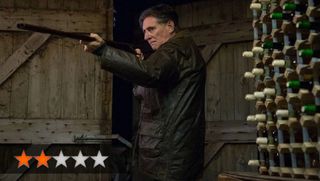
Lies We Tell
This debut from writer/director Mitu Misra stars Gabriel Byrne as chauffeur Donald, whose boss dies and leaves him the task of tidying away his affair with mistress Amber (Sibylla Deen).
As Donald gets drawn into her life, family issues come into focus – in a film that also aims for gangster grit, community awareness and emotional impact, but compromises on everything.
Director: Mitu Misra; Starring: Gabriel Byrne, Sibylla Deen, Mark Addy; Theatrical release: February 2, 2018
Matt Looker

Makala
In the Democratic Republic of Congo, a charcoal farmer endures back-breaking labour and dangerous journeys to support his family.
Emmanuel Gras’ film may be a doc, but with its luscious compositions and heart-rending score it plays like some post-apocalyptic Malick movie: thick dust storms, whispered prayers and an aching empathy for people scraping a living amid utter deprivation.
Director: Emmanuel Gras; Theatrical release: February 2, 2018
Tim Coleman

Roman J. Israel, Esq
Denzel Washington plays an autistic lawyer who loves soul music and lives a humble life. Through a series of circumstances, he gets embroiled in a murder case and soon finds himself abandoning his ideals for easy money. His sudden about-face edges him towards ethical (and literal) doom.
Muddy and slow in spots, but offbeat enough to keep you watching.
Director: Dan Gilroy; Starring: Denzel Washington, Colin Farrell, Carmen Ejogo; Theatrical release: February 2, 2018
Ken McIntyre

Den of Thieves
Set in modern-day LA, this sprawling crime thriller bears more than a passing resemblance to Michael Mann’s Heat. Once again, a gang of armed criminals plans a bank robbery, while being hunted by an elite police unit, led by a maverick detective.
Directed by Christian Gudegast, it’s proficiently put together but decidedly derivative, right down to the Usual Suspects-esque twist ending.
Director: Christian Gudegast; Starring: Gerard Butler, Pablo Schreiber, O'Shea Jackson Jr.; Theatrical release: February 2, 2018
Tom Dawson
The Total Film team are made up of the finest minds in all of film journalism. They are: Editor Jane Crowther, Deputy Editor Matt Maytum, Reviews Ed Matthew Leyland, News Editor Jordan Farley, and Online Editor Emily Murray. Expect exclusive news, reviews, features, and more from the team behind the smarter movie magazine.
